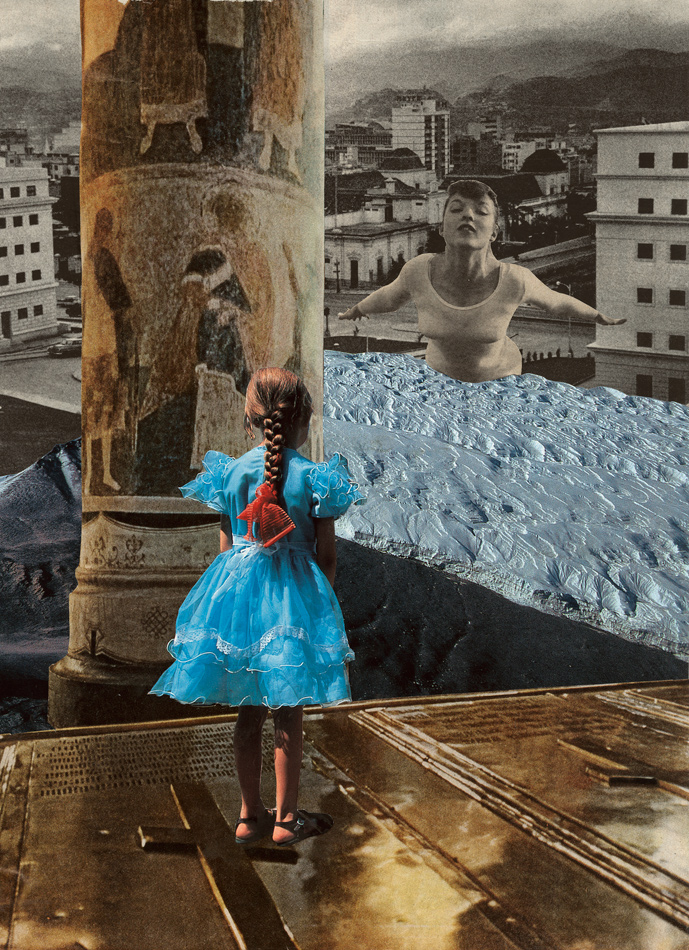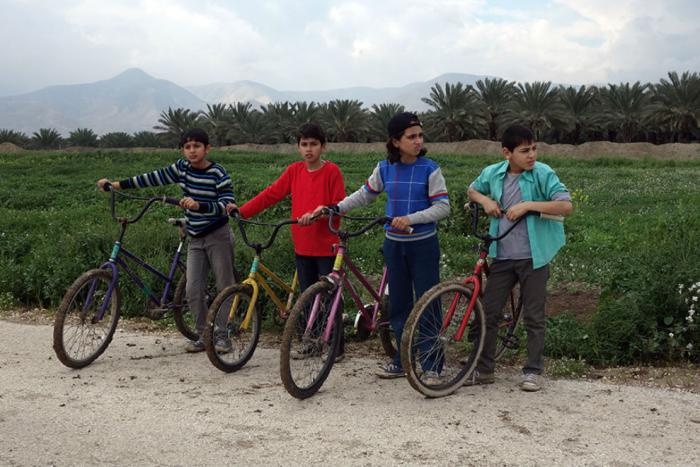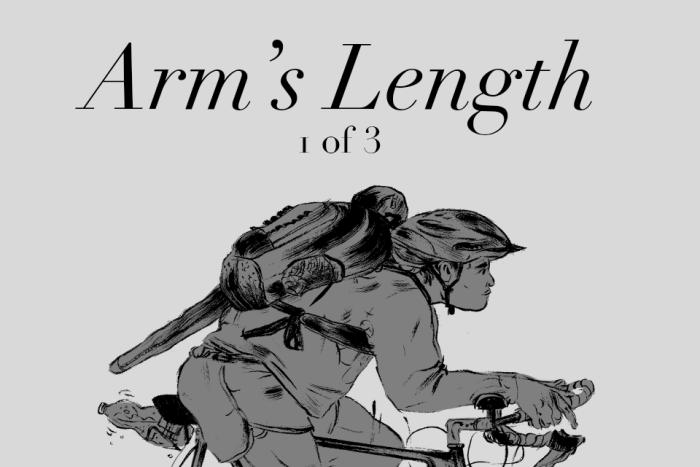
Mouthful is a new monthly column about the author’s relationship with food, ten years into recovery from anorexia and bulimia.
It’s July, sticky. My husband is fixing me an egg sandwich while I sit on the couch, my face stained with tears. A small fan offers the kind of comfort one can only find in a post-crying state. Three weeks ago, my husband was diagnosed with testicular cancer. A week later, a surgeon removed his testicle, and this afternoon, we will meet with an oncologist who will tell us what needs to happen next in his treatment: surgery to remove lymph nodes from his abdomen, or two rounds of chemotherapy. He’ll likely suggest a new blood test is needed, as the last one is already two weeks old. My husband has never liked surprises. Now he likes them even less.
We’re moving to Los Angeles in three weeks, so it looks like a bomb has gone off in our studio apartment: piles of miscellaneous items removed from shelves, clothes for donating, scraps of bubble wrap and tape. My in-laws came by the other day to take boxes to storage—mostly books, as that’s the majority of what we have in this world. My bank account is empty. I’m days away from completing edits on a book for which I’ll receive a small sum of money that will pay for our move, and little else. I’m overwhelmed.
Amidst all of this, I haven’t felt much like eating. This is behind my husband’s preparation of the egg sandwich: he’s been keeping an eye on me for the last few days, since I admitted to him that the stress of writing this particular column, and embarking on a year of writing about my relationship with food, has dredged up old fear and shame, and cast my lifelong loneliness into relief. Loneliness was the foundation of my eating disorder; I starved for attention and also to disappear from a world that I felt had already rejected me. Now nine years into my recovery from anorexia and bulimia, I had come to believe until recently that the complications in my relationship with food were behind me; that food was no longer my homing device; that it no longer needed to be the metric of my daily health.
In February 2007, I checked into eating disorder rehab in Tampa, Florida, where I would stay for sixty days. I was in my last year of college, double-majoring in English and secondary education. I’d reached the all-time low weight of eighty-nine pounds and was addicted to Adderall and diet pills, ingesting little more than four Venti Starbucks coffees and a pack of cigarettes a day. I was rarely sleeping. When I hit bottom, I was in the process of training myself how to eat toilet paper because I’d read on a pro-ana website that it was a supermodel trick. I spent most of my time alone.
Just out of rehab, I attended NA and OA meetings, but the message didn’t stick and I quickly relapsed. I took up shoplifting on top of my drinking and starving, and was hanging out with the ex-girlfriend of my then-current boyfriend, both of them wild alcoholics. By the end of that summer, my plan was to move to Chicago to live with him, but two months out of rehab, I grew afraid of what that would mean for my future chances of survival. Though I’d relapsed, the messages I’d heard in rehab had implanted themselves somewhere in the lower levels of my brain: I didn’t want to be miserable anymore. I wanted to escape this lifestyle. When my best friend’s cousin, also a recently sober addict looking to escape, invited me to hop freight trains up the east coast with him, I called my boyfriend and told him we were breaking up.
That September, I jumped from a freight train that was pulling into a rail yard in Buffalo. I landed on the railroad tracks, on my face. I received 150 stitches and lost an incisor that needed to be replaced with several rounds of oral surgery, and over the next nine years, I put all of my effort into climbing my way out of the shit.
***
A few months ago, I received an email from another writer who was doing research for an essay about eating disorders in literature. She asked if she could interview me about the role of food in my writing and life. I rarely turn down an interview, but this time, I hesitated before answering. Since publishing my first novel last year, about a woman struggling with anorexia, I’d convinced myself that the publication of the book had allowed me to become free of that past version of myself; that, in writing about her, I was permanently extracting her from my worldview. I no longer needed to think about her as part of me.
When I finish this column, I’ll be ten years into recovery. This first decade has shown me that I can use food to nourish instead of punish myself; that I don’t deserve punishment simply for being human; that I can do amazing things with my body when it’s healthy; that I am worthy of others’ love.
But this writer’s questions—about eating disorders as a form of resistance; the difficulty of writing anything that doesn’t directly touch upon food; the stigmatization of writing about eating disorders—unsettled me. I felt an inner resistance to answering them, almost defensive. Since publishing my novel, I found I now wanted to distance myself from the image of the woman who writes about eating disorders, with its gendered overtones; I didn’t like that she had identified me this way. “I'm at a stage in my recovery where I need to distance myself a bit from the mode of thinking I had while I was sick,” I told her. In the weeks afterward, I reflected further on my reaction, and was surprised by my uncharacteristic defensiveness. Since when do I care about gender stereotypes? Was there an underlying cause for my resistance to talking about food issues? Is it possible that food plays a larger role in my life than I believe, even now?
It brought me back to an afternoon in my grandparents’ house when I was seven years old: I’m visiting for two weeks over the summer. I’m alone in the home office, where my grandmother does the books for my grandfather’s industrial barrel company. I’ve been alone for most of the afternoon, like usual. I find my way into her desk drawer, where there sits a box of staples, and removing a sheet, I see the glint of the staples’ sharp edges. I drag my thumb across them, feeling the kiss of the metal. I do the same on each finger, each time a little bit harder, until each of the pads of my fingers is bleeding. This is the year I first notice the numbers on the side of my box of macaroni and cheese, and start adding them up. Nine years later, I go to rehab for the first time, for cutting myself. That same year, I begin throwing up my food.
As an only child, I became acquainted with loneliness at a young age. There were kids in my neighborhood, and all of us were friends, but I spent many long days in solitude. I was shy and would take it personally when other kids didn’t want to hang out with me. I developed obsessive crushes that had me convinced my loneliness would come to an end if only so-and-so loved me. I learned ways of escaping myself. Starvation became a pain to stand in for the pain of loneliness; a way to account for it, and also to punish myself for being unlovable. The self-induced isolation of my eating disorder was better, more bearable, than the isolation that remained without it. In the absence of human connection, starvation organized my life and gave it a sense of purpose.
Recently, a friend asked me if I was lonely and I answered no, then qualified: “Yes, by nature and by design.” I explained that loneliness is central to my role as an artist; that solitude is necessary for me to do my work, and that within it, my loneliness teaches me things about myself that I can’t learn any other way. For instance, my reasons for seeking validation from others, and my means of doing so, and how they may be unfair. Or how little I matter within in the vastness of the universe. Or how much of my life I feel I need to hide from those closest to me, even as I crave connection.
I’ve worked from home since May of last year. My office is the couch and coffee table. My kitchen is less than ten feet to my right while I’m writing. Whereas I learned to love cooking in the years after the train accident, since getting married I’ve gradually given up the task of preparing meals. My husband is a more talented cook than I am, so he usually handles dinner, and during the days, feeding myself is as simple as walking to the refrigerator and retrieving a slice of deli meat. Sometimes, when I’m deep in my reading or writing, I’ll notice my hunger but delay attending to it, testing the limits of my discomfort. Sometimes we’ll be out of food but the task of walking to the supermarket will seem like a chore, so instead of doing so, I’ll just stay hungry for a while.
Once you learn a way of thinking, you know it forever. In times of stress, you return to ways of thinking that feel safe and familiar—what has helped you feel better in the past, helped you focus on a pain of your own creation instead of what’s really hurting, helped you feel in control when your life was cracking up. Lately, I have not felt much like eating. When my in-laws came to pick up boxes the other day, they brought along groceries: ham and cheese, challah bread, strawberries, olives, Persian cucumbers, carrots, hummus, cheese, and lemonade. We had eggs already, as I’ve learned that it’s important for me to start each day with a breakfast of eggs and tea. I prepare them while my husband sleeps on the other side of the small studio, then I bring them to the coffee table, where I eat them as I’m writing.
When I finish this column, I’ll be ten years into recovery. This first decade has shown me that I can use food to nourish instead of punish myself; that I don’t deserve punishment simply for being human; that I can do amazing things with my body when it’s healthy; that I am worthy of others’ love.
But it’s time for a closer accounting of where I stand today in relationship to food. How does it reflect how I feel about myself? How does it stand in for fear, love, or loneliness? How does it show me who I am? In three weeks, I’ll be moving across the country, leaving behind ten years of friendships I’ve made in New York City, and going about the task of making new ones in Los Angeles. Within days of our arrival, my husband will undergo one of the most painful experiences of his life, and I will be there with him, preparing his food. Each day, meanwhile, I will need to eat, too, and each time I do so, my choices about food will reflect the ways that I love myself. I’m starting with this egg sandwich.
Photo collage by Sarah Gerard.





